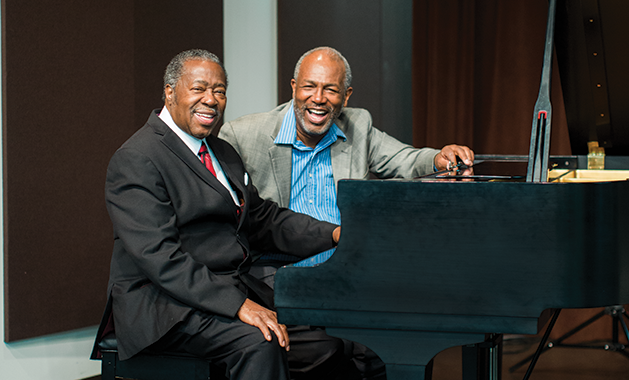
When Woodbury resident Grant West came to the Twin Cities in 1966, it was the beginning of an adventure. Not only with the beginnings of the Walker West Music Academy in St. Paul, but with the evolution of his musical career. “I had a natural curiosity for music,” West says. “It was all around me growing up.”
West lived in Cheyenne, Wyoming, until he was 19, learning how to play the piano, playing music in the church and creating a bond with music that would last a lifetime. He studied at Casper Junior College for two years before moving to the Twin Cities and graduating from Concordia College in St. Paul. “Music has always been who I am at the core,” he says.
West’s father played trumpet, creating his first link to music. At an early age, West began taking piano lessons and playing in his church, giving him what he calls the “benefit of cultural tradition” in the early years of his music career. It provided him the basis for all different genres of music including gospel, jazz, rock ‘n roll, R&B, classical and pop.
His career in music is storied, from creating a band as a teenager to performing as a solo pianist to forming a piano duo with his brother that played for many important and popular figures throughout the Twin Cities. The duo, called the West Brothers, played for legends such as “Mr. Entertainment” Sammy Davis Jr., and for Prince at the wedding reception for his first marriage at Paisley Park. The two also played for mayoral inaugurations and met some of the most important movers and shakers in Minnesota government in the ‘70’s and ‘80’s.
But what he stakes his career on most now is the Walker West Music Academy. When he came to the Twin Cities, he soon met Reverend Carl Walker and they became “fast friends.” Both played in African American churches at the time, and West recalls a church gathering where he heard Walker play for the first time. “When I heard him play, I felt like I had known him for years,” West says. “And I could tell who his students were when they played.”
The idea for starting the music school began as a simple thought. “When we’d see each other, [Walker] would throw out this idea in passing … he’d say ‘I’ve got some students, you’ve got some students [both gave in-home lessons], we should start a music school,’” West says. Until one day, Walker called West and said, “I’ve got a place. We can start our school in this lower duplex in St. Paul.’”
The school started in that old Victorian home on Hague Avenue as a piano studio with just a few students. “The people upstairs loved it,” West says. “They loved it until they couldn’t find a place to park and there was always this music going on, which wasn’t exactly music because the students were just starting out.”
Walker and West held their music school in this location for a year before the landlord kicked them out. “But as fate would have it, there was a building on Selby Avenue,” West says. “It had formerly been a restaurant, the Hickory Stick Barbecue Restaurant … and in 1988, we took it on.”
In the 1960s through the early to mid 1980s, the Summit-University neighborhood of St. Paul wasn’t exactly booming. For years, it had been run down and left behind as a by-product of urban renewal and the development of downtown St. Paul and Minneapolis. “At that time, it was a high crime area,” West says, recalling a time when he was in a lesson with a student while watching a drug bust from the window of the school. “But it’s really transformed over the past 30 years.”
With the strong culture of the churches both Walker and West were a part of, plus the support they already garnered from the community in the first year of the school, Walker West Music Academy took off. “People really just came out to support us,” West says. “The community was very aware of us and people came with potted plants on opening day and helped us decorate the place and even helped us remodel the kitchen into lesson rooms.”
The restaurant the music school took over was converted after years of barbecue stains were scrubbed from the building. The main seating area of the restaurant was turned into the music hall. “The place really gained a reverence,” West says. “I remember being awed by it, and it became kind of like a holy place, which was uncommon to this community.”
As the music academy continued to gain popularity, West and Walker developed a unique style of teaching, one that West says is very different from how they learned to play. Where most teach to the eye, West says they teach to the ear. “We’re anxious that our students learn to play as quickly as possible,” West says. “We tell them ‘we’ll teach you to play by all means necessary’ while being as encouraging as possible.”
At Walker West, music is taught as a language, where the more a student learns, the more fluent he or she becomes in this method of communication and interaction. “We tell our students, after your lesson today, you’ll be able to do something that most people you know can’t,” West says. “You’re going to learn how to do something that’s hard. We don’t mess with the easy stuff here.”
Walker says he admires West and all he has been able to accomplish as the “brains” of the operation. Being willing and able to deliver to all kinds of students, both hard-to-reach ones and those he can reach instantly, is what Walker says has made the academy as vibrant as it is today.
From the beginning, Walker and West have been close friends and musicians. A pianist himself, Walker says there was a time when they were literally the others’ second hand—when the academy had just one piano for lessons, one would teach the right hand and the other would teach the left.
But even more than that, Walker admires how West has developed his teaching methods and how successful he’s been. “My favorite part is watching him teach,” Walker says. “That man can teach some music. He makes music so much fun.”
One student of West’s, 10-year-old Caleb Nesbitt, says he loves being a part of the academy and studying with West. After almost three years of lessons and learning two instruments—piano (and clarinet at school)—West says Caleb is an “exceptional student.” “I like being a musician because everyone likes music,” Caleb says. “You can feel the rhythm of it … and I like the way Mr. West teaches me because he never gives up on me and he just makes it fun.”
Walker West Music Academy earned a prestigious Sally Award in 2016 to recognize all they’ve been able to achieve with their students and all the artists and teachers have done to enrich arts education in the area. The academy has become known for its teaching philosophy and how it supports students through music education. “The students today have many more challenges than they had when we started,” West says. “It’s amazing to me how excited they are and how thankful they are to be getting lessons. As a teacher, it gives you an insight into what’s going on with them, what their fears are.”
Two years ago, Walker West moved into its third location—one that was designed specifically for the academy that remains on Selby Avenue. “We’re blessed in terms of what we’ve been able to accomplish,” West says.
Not only has the student population grown, but the teachers and staff have, too. Most of the teachers are also performers—what West calls one of the “magic ingredients” for the academy. All ages are welcome to take lessons at the academy, and West himself is a perfect example—he’s learning to play guitar after piano has been his primary instrument for decades. “Music is something that people wish they could do,” he says. “But you don’t outgrow the ability. You can do it at any age.”









